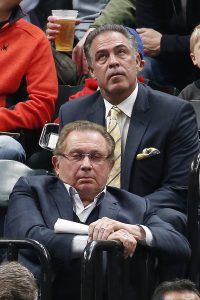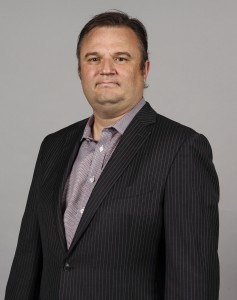While the NBA won’t announce this year’s award winners until late in June, we’re making our picks for the year’s major awards over the next two weeks.
The Hoops Rumors writing team has weighed in with our choices below, but we also want to know which players, coaches, and executives you think are most deserving of the hardware this season, so jump into the comments section below to share your thoughts.
We’re kicking things off today with the award for Executive of the Year. Here are our selections:
 Clark Crum: Kevin Pritchard (Pacers)
Clark Crum: Kevin Pritchard (Pacers)
Count me in as one of the many who believed the Thunder fleeced the Pacers last summer when they traded for Paul George and only got Victor Oladipo and Domantas Sabonis in return. George, 27, was a perennial All-Star and widely thought of as being one of the best two-way players in the NBA, while Oladipo, 25, had largely underperformed as a former No. 2 overall pick and Sabonis, 21, was still unproven.
Fast-forward 10 months later and Pritchard has made all of us doubters look like fools, as Oladipo was named an All-Star and largely outperformed George during the 2017/18 campaign, while Sabonis averaged 17.5 PPG in Indiana’s last four playoff games against the Cavaliers. Throw in the team-friendly offseason signings of starters Darren Collison and Bojan Bogdanovic – whose non-guaranteed contracts for next season combined total only $20.5MM – and the trade for sixth-man Cory Joseph while giving up essentially nothing in return, and you end up with a team that improved its win total by six games after trading away its franchise cornerstone.
Dana Gauruder: Dennis Lindsey (Jazz)
Losing your best player in free agency usually sets back a franchise for years. The Jazz should have been an also-ran when Gordon Hayward bolted. Instead, Lindsey solved their long-standing point guard issue and made them a playoff team. Trading up for Donovan Mitchell turned out to be a master stroke and Ricky Rubio bridged the gap to the Mitchell era.
Austin Kent: Kevin Pritchard (Pacers)
The 2017/18 Pacers were a breath of fresh air in a barely habitable runaway tankathon and that’s why Pritchard gets my pick for Executive of the Year. Rather than kowtow to the presumed fate of small-market teams destined to lose a franchise player, Pritchard wheeled Paul George to Oklahoma City for an intriguing young big man and an underwhelming former No. 2 pick. We didn’t know it then, but Pritchard had a meaningful plan to continue competing despite the setback. Rather than pass the buck and settle for the safe choice of an ambiguous future draft choice, Pritchard brought home tangible assets. The gamble on Victor Oladipo was a massive success — if he isn’t already as capable as George ever was in a Pacers jersey, he’s definitely more marketable. Domantas Sabonis, on the precipice of his 22nd birthday, looks every bit as promising as he did during his rookie season.
Pritchard didn’t settle there. Even if you chalk the George deal up to a pleasant surprise, the freshly-minted executive doubled down on the strategy to fill the team’s roster with capable adult basketball players. Crazy, right? The acquisition of Cory Joseph was shrewd and the signings of Bojan Bogdanovic and Darren Collison reinforce the notion that the man at the helm in Indianapolis has had a singular plan all along: while half the NBA zigs their way to uninspired combinations of current and former superstars and the other zags their way into the sub-20-win cellar, the Pacers barrelled down the middle.
Arthur Hill: Danny Ainge (Celtics)
Not only did he win the Gordon Hayward sweepstakes and get Kyrie Irving from the Cavaliers, Ainge pulled off a spectacular draft-related trade that looks better with each passing day. Instead of making the safe move by taking Markelle Fultz with the top pick, Ainge sent it to Philadelphia in exchange for the No. 3 choice, which brought Jayson Tatum, and a future first-rounder, which will probably be Sacramento’s in 2019. The Celtics could have been the No. 1 seed in the East if not for injuries to Hayward and Irving, and they still have the ammunition to trade for a star like Kawhi Leonard if he becomes available, giving Ainge a shot to win this award again next year.
Chris Crouse: Daryl Morey (Rockets)
This season’s Executive of the Year’s race was Morey’s to lose ever since he crafted the deal to bring Chris Paul to Houston. The Rockets headed into the 2017 offseason as an over-the-cap team, meaning they had to adhere to salary-matching rules in trades. The problem was that the Rockets had so much of their cap tied up in cap holds, rather than players under contract, that they couldn’t get to Paul’s $24.2MM figure without being creative.
Luke Adams: Danny Ainge (Celtics)
Ainge has taken plenty of criticism over the years for his apparent reluctance to roll the dice on potential blockbuster trades, but his 2017/18 moves vindicated that approach in spades. In signing Gordon Hayward, trading for Kyrie Irving, and flipping the No. 1 overall pick, Ainge swung for the fences to greater effect than than he ever did during his baseball days. The decision to hang onto young players like Jaylen Brown and Terry Rozier also paid off in a major way for Ainge and the Celtics, who saw those youngsters – along with Jayson Tatum – enjoy breakout seasons. Under-the-radar additions like Shane Larkin and Daniel Theis were just the icing on the cake.
Who is your pick for Executive of the Year? Share your choices and your thoughts in the comment section below!
Up next: Coach of the Year.
Photos courtesy of USA Today Sports Images.
Phil Jackson
Lol jk
I would pick Kevin Pritchard. The George for Oladipo trade turned out great, and the Collison and Bogdanovic signings reinforced a playoffs team. It seemed like the Pacers would suck at the start of the year, but the moves from Pritchard that not everyone would make proved to pay off.
Sam Hinkie gets my vote! #TrustTheProcess
Nah. For two reasons…
1. The process was to lose. That’s not genius.
2. The trade for Fultz. Disaster.
He didn’t trade do Fultz
Yes he did. Celtics were the original number 1
Um Sam Hinkie hasn’t been there since June of 2016. Is there a chance you may be living under a rock?
Ainge
Celtics fan in me wants Ainge to win it. That said, Dennis Lindsay in Utah has such a strong case.
Morey 1, Prichard 2
Ainge, hands down. Because…
1. The sixers trade and still getting the best player.
2. Not moving Brown.
I won’t give him credit for Hayward – personally I’d have held off and kept those dollars stashed for this year’s crop of FA’s (specifically Cousins). Cousins, Horford, Tatum, Brown, and Irving along with a potential top 3 pick this year along with Rozier and Smart off the bench, what a team. And prior years, making the right picks and trades…then hiring the right coach.
I hate the Celtics, but gotta give credit when it’s due.
Hayward was the best FA last season and fits Brad’s system perfectly.
No way LeBron is joining Cs. Durant staying with Dubs. So this FA the prize either PG13 or Cousins.
PG13 is very similar to Hayward — in vacuum arguably better due to elite D but not as perfect a fit and ‘No OT cuz not clutch’. Like Cousins, been more volatile (forcing self out of Indiana too) and stated wants to goto LA. Hayward also ascending each and every season so far and better playoffs
That leaves Cousins coming off an Achilles tear, ungoing surgery 2 months ago… one of the worst injuries in bball, esp for bigs. 6-10 month recovery means won’t be ready for camp and very likely to begin the season — and won’t be 100% all next season, possibly longer. Some are wondering if teams (including Pels) will even offer him max w/ that risk.
So I don’t see how getting Hayward was anything but a great coupe. Even knowing of his ankle break — bones heal almost always with little long-term affects — I’d still do the signing for a top 20 player who fits Brads offensive and defensive scheme perfectly.
Horford plays the center half the time and to end games anyway. So three very talented wings (Tatum bulking up to the 4 position like at Duke), Horford and Kyrie is an awesome death lineup.
Pritchard, indiana… because he represents rejecting the idea of tanking, and supported that by winning with people not abstractions (like draft picks).
Sam Hinkie